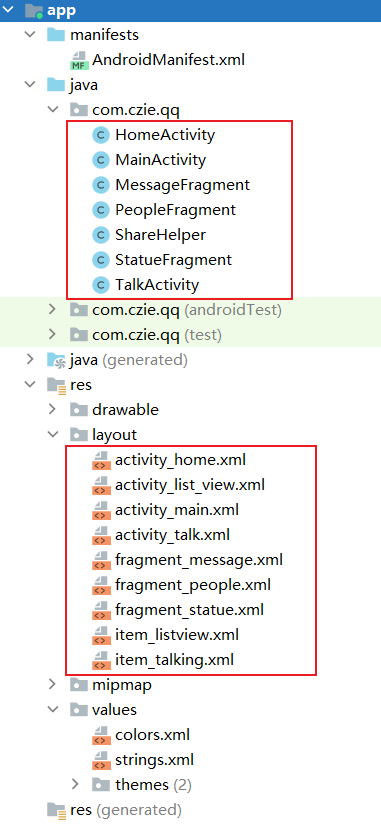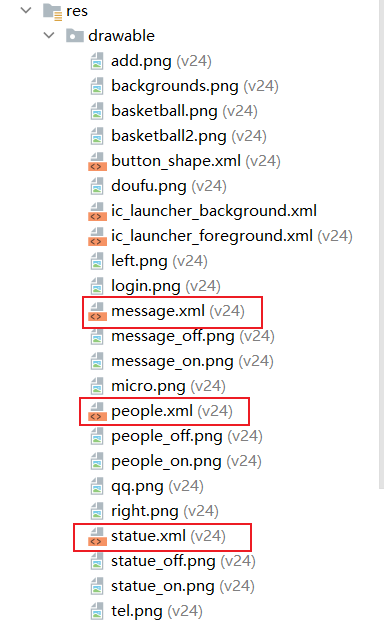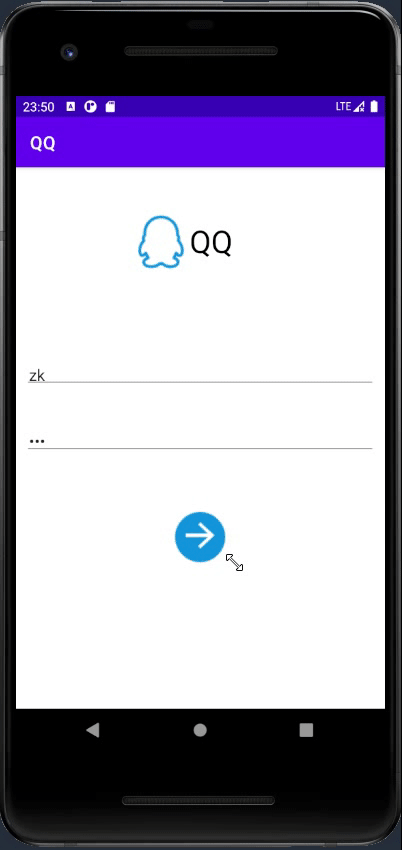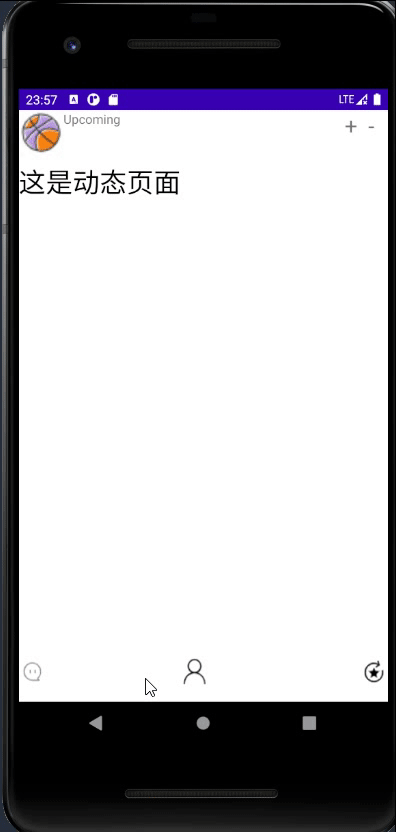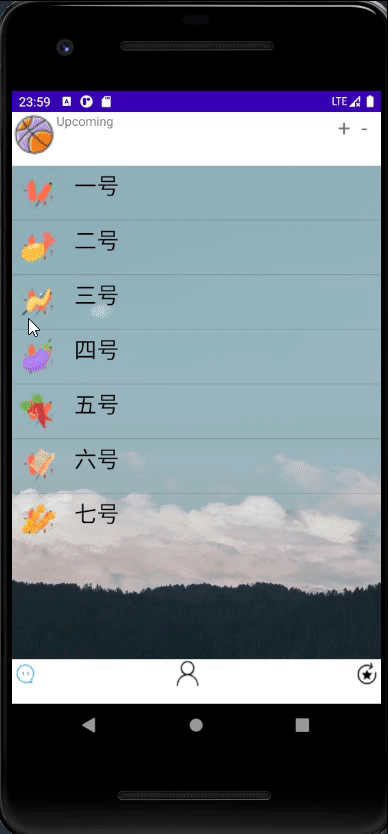Angdroid Studio仿QQ界面实现简单的功能
写在前面
由于本人初学阶段,写这篇博客是总结所学的知识点,为后面的进阶打好基础
有任何关于代码和表述问题,欢迎评论区指出
楼主近期在学习关于安卓中Fragment和ListView中的知识,按照老师的要求模仿一下QQ界面 要求功能
- 有登录界面
- 密码不对提示密码不对
- 账号密码任一为空提示用户不能为空
- 登录成功提示登录成功
- 可以实现账号密码记住功能
- 有三个界面可以点击底部按钮实现页面的切换
- 实现按钮选中状态和未选中状态不一样
- 联系人界面
- 信息界面
- 状态界面
- 发送信息功能
- 点击信息界面中的任意消息可以进入发消息界面
- 可以实现点击发送按钮将所输入的文字显示在屏幕中
提示:本人用的IDE开发环境是Android Studio API是30
目录结构一览
res中的文件
1. 登录界面
- 登录界面的布局文件
activity_main.xml
所用图标都可以在阿里巴巴图标网找到iconfont-阿里巴巴矢量图标库
<RelativeLayout xmlns:android="http://schemas.android.com/apk/res/android"
xmlns:app="http://schemas.android.com/apk/res-auto"
xmlns:tools="http://schemas.android.com/tools"
android:layout_width="match_parent"
android:layout_height="match_parent"
tools:context=".MainActivity">
<LinearLayout
android:layout_width="match_parent"
android:layout_height="match_parent"
android:layout_marginLeft="10dp"
android:layout_marginRight="10dp"
android:orientation="vertical"
tools:ignore="UselessParent">
<TextView
android:drawableLeft="@drawable/qq"
android:layout_width="wrap_content"
android:layout_height="wrap_content"
android:layout_marginTop="50dp"
android:layout_marginLeft="120dp"
android:gravity="center"
android:text="QQ"
android:textColor="#000000"
android:textSize="35sp"
app:drawableStartCompat="@drawable/qq"
android:drawableStart="@drawable/qq"
tools:ignore="UseCompatTextViewDrawableXml"
android:layout_marginStart="120dp">
TextView>
<EditText
android:id="@+id/userNameEditText"
android:layout_width="match_parent"
android:layout_height="wrap_content"
android:layout_marginTop="100dp"
android:hint="请输入用户名/账号/手机号"
android:inputType="text"
android:padding="5dp">
EditText>
<EditText
android:id="@+id/passwordEditText"
android:layout_width="match_parent"
android:layout_height="wrap_content"
android:layout_marginTop="40dp"
android:hint="请输入密码"
android:inputType="textPassword"
android:padding="5dp">
EditText>
<ImageButton
android:id="@+id/loginButton"
android:layout_marginTop="60dp"
android:layout_gravity="center"
android:layout_width="60dp"
android:layout_height="60dp"
android:src="@drawable/login"
android:background="#fff">
ImageButton>
LinearLayout>
RelativeLayout>
所对应的MainActivity
- 其中的判断通过if语句判断用户是否输入和输入正确
- 提示 通过
Toast的方式提示
package com.czie.qq;
import androidx.appcompat.app.AppCompatActivity;
import android.annotation.SuppressLint;
import android.content.Context;
import android.content.Intent;
import android.os.Bundle;
import android.view.View;
import android.widget.Button;
import android.widget.EditText;
import android.widget.ImageButton;
import android.widget.Toast;
public class MainActivity extends AppCompatActivity {
private Context context;
private EditText userNameEditText, passwordEditText;
private ImageButton loginButton;
private ShareHelper shareHelper;
@Override
protected void onCreate(Bundle savedInstanceState) {
super.onCreate(savedInstanceState);
setContentView(R.layout.activity_main);
context=this;
shareHelper=new ShareHelper(context);
initview();
}
private void initview() {
userNameEditText = findViewById(R.id.userNameEditText);
passwordEditText = findViewById(R.id.passwordEditText);
loginButton = findViewById(R.id.loginButton);
loginButton.setOnClickListener(new View.OnClickListener() {
@Override
public void onClick(View view) {
//进行登录页面的处理
String username = userNameEditText.getText().toString();
String password = passwordEditText.getText().toString();
if (username.length() > 0) {
if (username.equals("zk")) {
if (password.length() > 0) {
if (password.equals("123")) {
// 对账号和密码进行保存
shareHelper.save("username",username);
shareHelper.save("password",password);
startActivity(new Intent(MainActivity.this, HomeActivity.class));
Toast.makeText(MainActivity.this, "登录成功", Toast.LENGTH_SHORT).show();
} else {
Toast.makeText(MainActivity.this, "密码不正确", Toast.LENGTH_LONG).show();
}
} else {
Toast.makeText(MainActivity.this,"请填写密码",Toast.LENGTH_LONG).show();
}
} else {
Toast.makeText(MainActivity.this,"用户名不正确",Toast.LENGTH_LONG).show();
}
} else {
Toast.makeText(MainActivity.this,"请填写用户名",Toast.LENGTH_LONG).show();
}
}
});
}
@Override
protected void onStart() {
super.onStart();
userNameEditText.setText(shareHelper.read("username"));
passwordEditText.setText(shareHelper.read("password"));
}
}
2. 记住密码功能
- 实现第一次登录成功后,再次登录会记住账号和密码的功能
这个功能我们用SharedPreferences
简单了解下什么是SharedPreferences
- SharedPreferences是Android平台上一个轻量级的存储辅助类,用来保存应用的一些常用配置,它提供了string,set,int,long,float,boolean六种数据类型。最终数据是以xml形式进行存储。在应用中通常做一些简单数据的持久化缓存。
package com.czie.qq;
import android.content.Context;
import android.content.SharedPreferences;
public class ShareHelper {
//两个功能 保存,读取
Context context;
public ShareHelper() {
}
public ShareHelper(Context context) {
this.context = context;
}
//保存
public void save(String key, String value) {
SharedPreferences sharedPreferences = context.getSharedPreferences("iot1921", Context.MODE_PRIVATE);
//创建一个输入值
SharedPreferences.Editor editor = sharedPreferences.edit();
editor.putString(key, value);
editor.commit();
}
//读取数据
public String read(String key) {
SharedPreferences sharedPreferences = context.getSharedPreferences("iot1921", Context.MODE_PRIVATE);
return sharedPreferences.getString(key, "");
}
}
注意事项:
- 输入值记得提交,editor.commit();
- 在
MainACtivity中记得在OnStart方法中使用ShareHelper.read传入需要记住的值!
预览一下成果!
3. Fragment界面跳转
这里有三个Fragment,所对应需要三个fragment布局界面
- 首先要创建3个按钮的切换xml
message.xml
<selector xmlns:android="http://schemas.android.com/apk/res/android">
<item android:drawable="@drawable/message_on" android:state_selected="true"/>
<item android:drawable="@drawable/message_off" android:state_selected="false"/>
selector>
people.xml
<selector xmlns:android="http://schemas.android.com/apk/res/android">
<item android:drawable="@drawable/people_on" android:state_selected="true"/>
<item android:drawable="@drawable/people_off" android:state_selected="false"/>
selector>
statue.xml
<selector xmlns:android="http://schemas.android.com/apk/res/android">
<item android:drawable="@drawable/statue_on" android:state_selected="true"/>
<item android:drawable="@drawable/statue_off" android:state_selected="false"/>
selector>
然后在布局界面中使用
activity_home.xml
这个界面的布局可以随意发挥,本人做的比较简单,见谅
- 3个
ImageView和1个FrameLayout ImageView分别绑定点击事件
<LinearLayout xmlns:android="http://schemas.android.com/apk/res/android"
xmlns:app="http://schemas.android.com/apk/res-auto"
xmlns:tools="http://schemas.android.com/tools"
android:layout_width="match_parent"
android:layout_height="match_parent"
android:orientation="vertical">
<LinearLayout
android:layout_width="match_parent"
android:layout_height="wrap_content"
android:orientation="horizontal">
<ImageView
android:layout_width="50dp"
android:layout_height="50dp"
android:src="@drawable/basketball">
ImageView>
<TextView
android:layout_width="wrap_content"
android:layout_height="match_parent"
android:text="Upcoming">
TextView>
<TextView
android:layout_width="50dp"
android:layout_marginLeft="250dp"
android:layout_height="match_parent"
android:text="+ -"
android:textSize="25sp">
TextView>
LinearLayout>
<FrameLayout
android:layout_marginTop="10dp"
android:id="@+id/frameLayout"
android:layout_width="match_parent"
android:layout_height="550dp">
FrameLayout>
<LinearLayout
android:layout_width="wrap_content"
android:layout_height="match_parent"
android:orientation="horizontal">
<ImageView
android:id="@+id/messageImageView"
android:layout_width="wrap_content"
android:layout_height="wrap_content"
android:layout_marginLeft="60dp"
android:background="@drawable/message"
android:layout_weight="1"
android:layout_marginStart="0dp">
ImageView>
<ImageView
android:id="@+id/peopleImageView"
android:layout_width="wrap_content"
android:layout_height="wrap_content"
android:layout_marginLeft="150dp"
android:background="@drawable/people"
android:layout_weight="1"
android:layout_marginStart="150dp"
tools:ignore="ContentDescription">
ImageView>
<ImageView
android:id="@+id/statueImageView"
android:layout_width="wrap_content"
android:layout_height="wrap_content"
android:layout_marginLeft="170dp"
android:background="@drawable/statue"
android:layout_weight="1"
android:layout_marginStart="170dp"
tools:ignore="ContentDescription">
ImageView>
LinearLayout>
LinearLayout>
3.1 Fragement的界面编写
item_listview.xml
<LinearLayout xmlns:android="http://schemas.android.com/apk/res/android"
xmlns:tools="http://schemas.android.com/tools"
android:layout_width="match_parent"
android:layout_height="match_parent"
android:orientation="vertical"
android:background="@drawable/backgrounds">
<ListView
android:id="@+id/messagelistView"
android:layout_width="match_parent"
android:layout_height="wrap_content">
ListView>
LinearLayout>
fragment_message.xml
<LinearLayout xmlns:android="http://schemas.android.com/apk/res/android"
xmlns:tools="http://schemas.android.com/tools"
android:layout_width="match_parent"
android:layout_height="match_parent"
android:orientation="vertical"
android:background="@drawable/backgrounds">
<ListView
android:id="@+id/messagelistView"
android:layout_width="match_parent"
android:layout_height="wrap_content">
ListView>
LinearLayout>
fragment_people.xml
<LinearLayout xmlns:android="http://schemas.android.com/apk/res/android"
xmlns:tools="http://schemas.android.com/tools"
android:layout_width="match_parent"
android:layout_height="match_parent">
<TextView
android:layout_width="match_parent"
android:layout_height="wrap_content"
android:textSize="30sp"
android:textColor="#000000"
android:text="这是联系人页面"
tools:ignore="MissingConstraints">
TextView>
LinearLayout>
fragment_statue.xml
<LinearLayout xmlns:android="http://schemas.android.com/apk/res/android"
xmlns:tools="http://schemas.android.com/tools"
android:layout_width="match_parent"
android:layout_height="match_parent">
<TextView
android:layout_width="match_parent"
android:layout_height="wrap_content"
android:textSize="30sp"
android:textColor="#000000"
android:text="这是动态页面"
tools:ignore="MissingConstraints">
TextView>
LinearLayout>
Fragment布局写完就是重点如何在FrameLayout中加载
我们还需要创建布局所对应的Fragment
每个Fragment要指定加载的布局和调用的方法
onCreateView():每次创建、绘制该Fragment的View组件时回调该方法,Fragment将会显示该方法返回的View组件。
onActivityCreated():当Fragment所在的Activity被启动完成后回调该方法。
在这个文件中需要实现
- 点击进入聊天界面
- 可以发送消息显示在屏幕上
我们通过List集合中存放Map
Map中所存放的Key就是所创建的Names数组,Value就是Images数组
通过创建SimpleAdapter对象来加载fragment_message
讲下这三行关键的代码
//加载在哪个布局界面
messagelistView= getActivity().findViewById(R.id.messagelistView);
//适配器中的参数
/**
context 上下文
dataList 集合中存放的值
R.layout.item_listview 加载的布局界面
new String[]{"Name","Image"} String数组
new int[]{R.id.NameTextView,R.id.ImageView} int数组 获取id
*/
simpleAdapter=new SimpleAdapter(context,dataList,R.layout.item_listview,
new String[]{
"Name","Image"},
new int[]{
R.id.NameTextView,R.id.ImageView});
//加载适配器
messagelistView.setAdapter(simpleAdapter);
一个获取数据的方法getData()
//list获取数据
public void getData(){
//遍历数组中的数据 添加到list中
for (int i = 0; i < Names.length; i++) {
//新建map 存放数组中的数据 最后存放在list中
HashMap<String, Object> map = new HashMap<String, Object>();
map.put("Name",Names[i]);
map.put("Image",Images[i]);
dataList.add(map);
}
}
MessageFragment
package com.czie.qq;
import android.app.Fragment;
import android.content.Context;
import android.content.Intent;
import android.os.Bundle;
import android.view.LayoutInflater;
import android.view.View;
import android.view.ViewGroup;
import android.widget.AdapterView;
import android.widget.ListView;
import android.widget.SimpleAdapter;
import android.widget.Toast;
import androidx.annotation.Nullable;
import java.util.ArrayList;
import java.util.HashMap;
import java.util.List;
import java.util.Map;
public class MessageFragment extends Fragment {
private Context context;
private ListView messagelistView;
List<Map<String,Object>> dataList=new ArrayList<Map<String,Object>>();
String [] Names={
"一号","二号","三号","四号","五号","六号","七号"};
int [] Images={
R.mipmap.kaochang,R.mipmap.kaojitui,R.mipmap.kaojichi,R.mipmap.kaoqiezi,R.mipmap.kaolajiao,R.mipmap.kaojinzhengu ,R.mipmap.kaonanguabing};
//创建SimpleAdapter对象
private SimpleAdapter simpleAdapter;
@Nullable
@Override
public View onCreateView(LayoutInflater inflater, @Nullable ViewGroup container, Bundle savedInstanceState) {
return inflater.inflate(R.layout.fragment_message,container,false);
}
@Override
public void onActivityCreated(@Nullable Bundle savedInstanceState) {
super.onActivityCreated(savedInstanceState);
context=getActivity();
initView();
}
private void initView() {
messagelistView= getActivity().findViewById(R.id.messagelistView);
getData();
simpleAdapter=new SimpleAdapter(context,dataList,R.layout.item_listview,
new String[]{
"Name","Image"},
new int[]{
R.id.NameTextView,R.id.ImageView});
messagelistView.setAdapter(simpleAdapter);
//listView的项点击监听事件
messagelistView.setOnItemClickListener(new AdapterView.OnItemClickListener() {
@Override
public void onItemClick(AdapterView<?> adapterView, View view, int i, long l) {
//获取当前项的数据
String name=dataList.get(i).get("Name").toString();
Intent intent=new Intent(getActivity(),TalkActivity.class);
startActivity(new Intent(getActivity(), TalkActivity.class));
intent.putExtra("name",name);
Toast.makeText(context,"当前点击的选项名称是"+name,Toast.LENGTH_SHORT).show();
}
});
}
//list获取数据
public void getData(){
//遍历数组中的数据 添加到list中
for (int i = 0; i < Names.length; i++) {
//新建map 存放数组中的数据 最后存放在list中
HashMap<String, Object> map = new HashMap<String, Object>();
map.put("Name",Names[i]);
map.put("Image",Images[i]);
dataList.add(map);
}
}
}
PeopleFragment
package com.czie.qq;
import android.app.Fragment;
import android.os.Bundle;
import android.view.LayoutInflater;
import android.view.View;
import android.view.ViewGroup;
import androidx.annotation.Nullable;
public class PeopleFragment extends Fragment {
@Nullable
@Override
public View onCreateView(LayoutInflater inflater, @Nullable ViewGroup container, Bundle savedInstanceState) {
return inflater.inflate(R.layout.fragment_people,container,false);
}
@Override
public void onActivityCreated(@Nullable Bundle savedInstanceState) {
super.onActivityCreated(savedInstanceState);
}
}
StatueFragment
package com.czie.qq;
import android.app.Fragment;
import android.os.Bundle;
import android.view.LayoutInflater;
import android.view.View;
import android.view.ViewGroup;
import androidx.annotation.Nullable;
public class StatueFragment extends Fragment {
@Nullable
@Override
public View onCreateView(LayoutInflater inflater, @Nullable ViewGroup container, Bundle savedInstanceState) {
return inflater.inflate(R.layout.fragment_statue,container,false);
}
@Override
public void onActivityCreated(@Nullable Bundle savedInstanceState) {
super.onActivityCreated(savedInstanceState);
}
}
最后在HomeActivity中使用
了解什么是FragmentTransaction
使用Fragment时,可以通过用户交互来执行一些动作,比如增加、移除、替换等。
所有这些改变构成一个集合,这个集合被叫做一个transaction
HomeActivity
- 监听
ImgaeView的点击事件 - 初始化
ImageView的选中状态为false 通过方法传入参数从而判断哪个ImageView被点击 将被点击的状态设为false showFragment(Fragment fragment)中通过隐藏Fragment,点击ImageView时再判断显示哪个Fragment
package com.czie.qq;
import android.app.Activity;
import android.app.Fragment;
import android.app.FragmentManager;
import android.app.FragmentTransaction;
import android.os.Bundle;
import android.view.View;
import android.widget.ImageView;
@SuppressWarnings({
"all"})
public class HomeActivity extends Activity implements View.OnClickListener {
private ImageView messageImageView, peopleImageView, statueImageView;
private MessageFragment messageFragment;
private PeopleFragment peopleFragment;
private StatueFragment statueFragment;
private final FragmentManager fragmentManager = getFragmentManager();
@Override
protected void onCreate(Bundle savedInstanceState) {
super.onCreate(savedInstanceState);
setContentView(R.layout.activity_home);
initView();
initFragment();
showFragment(statueFragment);
}
private void initView() {
messageImageView = findViewById(R.id.messageImageView);
peopleImageView = findViewById(R.id.peopleImageView);
statueImageView = findViewById(R.id.statueImageView);
messageImageView.setOnClickListener(this);
peopleImageView.setOnClickListener(this);
statueImageView.setOnClickListener(this);
}
private void initFragment() {
messageFragment = new MessageFragment();
peopleFragment = new PeopleFragment();
statueFragment = new StatueFragment();
//展示
FragmentTransaction transaction = fragmentManager.beginTransaction();
transaction.add(R.id.frameLayout, messageFragment);
transaction.add(R.id.frameLayout, peopleFragment);
transaction.add(R.id.frameLayout, statueFragment);
transaction.commit();
}
@Override
public void onClick(View view) {
switch (view.getId()) {
case R.id.messageImageView:
init(messageImageView);
showFragment(messageFragment);
break;
case R.id.peopleImageView:
init(peopleImageView);
showFragment(peopleFragment);
//startActivity(new Intent(HomeActivity.this, ListViewActivity.class));
break;
case R.id.statueImageView:
init(statueImageView);
showFragment(statueFragment);
break;
default:
break;
}
}
public void init(ImageView imageView) {
messageImageView.setSelected(false);
peopleImageView.setSelected(false);
statueImageView.setSelected(false);
imageView.setSelected(true);
}
//展示指定的Fragment
//定义当前页面
private Fragment curFragment = new Fragment();
public void showFragment(Fragment fragment) {
//如果当前的fragment与传入的fragment是同一个,呢么将返回
if (curFragment.equals(fragment)) {
return;
}
FragmentTransaction transaction = fragmentManager.beginTransaction();
transaction.hide(messageFragment);
transaction.hide(peopleFragment);
transaction.hide(statueFragment);
transaction.show(fragment);
transaction.commit();
}
}
注意事项
- 记得
transaction要commit
预览一下成果!
4. 聊天界面
item_talking.xml
<LinearLayout xmlns:android="http://schemas.android.com/apk/res/android"
android:layout_width="match_parent"
android:layout_height="match_parent"
android:orientation="horizontal"
android:padding="10dp"
android:gravity="right">
<TextView
android:id="@+id/talkTextView"
android:layout_width="match_parent"
android:layout_height="wrap_content"
android:layout_marginLeft="300dp"
android:text="烤肠"
android:textSize="25sp"
android:textColor="#000000"
android:background="#cef"
android:layout_marginStart="300dp">
TextView>
<ImageView
android:id="@+id/ImageView"
android:layout_width="50dp"
android:layout_height="50dp"
android:background="@mipmap/kaochang">
ImageView>
LinearLayout>
activity_talk.xml
<RelativeLayout xmlns:android="http://schemas.android.com/apk/res/android"
android:layout_width="match_parent"
android:layout_height="match_parent">
<LinearLayout
android:layout_width="match_parent"
android:layout_height="wrap_content"
android:orientation="vertical">
<TextView
android:layout_width="match_parent"
android:layout_height="wrap_content"
android:gravity="center"
android:textColor="#000000"
android:text="康小庄"
android:id="@+id/NameTextView"
android:background="#44cef6">
TextView>
<ListView
android:id="@+id/listView2"
android:layout_width="match_parent"
android:layout_height="600dp"
android:layout_weight="1"
/>
<LinearLayout
android:layout_width="match_parent"
android:layout_height="match_parent"
android:orientation="horizontal"
android:layout_gravity="bottom"
>
<EditText
android:id="@+id/inputEditText"
android:layout_width="match_parent"
android:layout_height="match_parent"
android:layout_weight="1">
EditText>
<Button
android:id="@+id/sendButton"
android:layout_width="match_parent"
android:layout_height="match_parent"
android:layout_weight="3"
android:text="发送">
Button>
LinearLayout>
LinearLayout>
RelativeLayout>
TalkActivity
- 通过
Handler来实现消息发出去之后 对话框置为null - 通过
simpleAdapter实现加载到哪个布局界面的id
package com.czie.qq;
import android.app.Activity;
import android.content.Context;
import android.content.Intent;
import android.os.Bundle;
import android.os.Handler;
import android.os.Message;
import android.view.View;
import android.widget.Button;
import android.widget.EditText;
import android.widget.ListView;
import android.widget.SimpleAdapter;
import android.widget.TextView;
import androidx.annotation.NonNull;
import androidx.annotation.Nullable;
import java.util.ArrayList;
import java.util.HashMap;
import java.util.List;
import java.util.Map;
public class TalkActivity extends Activity implements View.OnClickListener {
private EditText inputEditText;
private SimpleAdapter simpleAdapter;
List<Map<String,String>> list=new ArrayList<Map<String,String>>();
@Override
protected void onCreate(@Nullable Bundle savedInstanceState) {
super.onCreate(savedInstanceState);
setContentView(R.layout.activity_talk);
Context context = this;
initView();
TextView nameTextView = findViewById(R.id.NameTextView);
Intent intent=getIntent();
String name=intent.getStringExtra("name");
nameTextView.setText(name);
}
private void initView() {
inputEditText=findViewById(R.id.inputEditText);
Button sendButton = findViewById(R.id.sendButton);
ListView listView2 = findViewById(R.id.listView2);
listView2.setDivider(null);
simpleAdapter=new SimpleAdapter(this,list,R.layout.item_talking,new String[]{
"message"},new int[]{
R.id.talkTextView});
listView2.setAdapter(simpleAdapter);
sendButton.setOnClickListener(this);
}
@Override
public void onClick(View view) {
sendMessage();
handler.sendEmptyMessage(0);
}
public void sendMessage(){
String message=inputEditText.getText().toString();
if (message.length()>0){
HashMap<String, String> map = new HashMap<>();
map.put("message",message);
list.add(map);
inputEditText.setText("");
}
}
Handler handler=new Handler(){
@Override
public void handleMessage(@NonNull Message msg) {
simpleAdapter.notifyDataSetChanged();
}
};
}
总结:
- 学会了简单的页面跳转功能,提高思考的能力,学会如何用较少代码实现功能
- 还有许多不足仍需努力
写在最后:
- 有任何错误欢迎评论区指出,及时改正!
